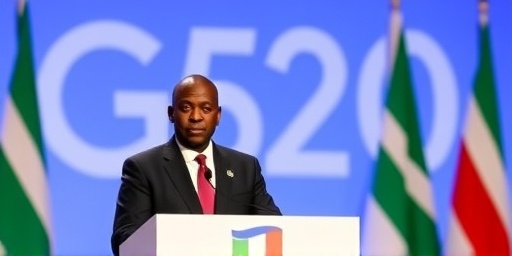In a passionate address at the ongoing G20 summit in Johannesburg, South African President Cyril Ramaphosa has thrust the spotlight on the escalating Wealth gap and development disparities plaguing the global economy. Labeling these inequalities as “unjust and unsustainable,” Ramaphosa urged world leaders to prioritize urgent reforms, warning that without action, the world risks deeper divisions and potential instability. The summit, hosted by South Africa for the first time in its G20 presidency, has become a critical forum for addressing these imbalances as economies grapple with post-pandemic recovery and geopolitical tensions.
Ramaphosa’s Fiery Call for Equity in Global Finance
President Ramaphosa’s remarks, delivered on the second day of the G20 summit, painted a stark picture of a world where the richest 1% own nearly half of all global wealth, according to recent Oxfam reports. “The Wealth gap is not just a statistic; it is a moral failing that undermines our shared humanity,” Ramaphosa stated, emphasizing how development in emerging markets like Africa lags far behind. He highlighted South Africa’s own struggles, where unemployment hovers at 32% and inequality metrics rank among the world’s highest, as microcosms of broader global economy challenges.
Drawing from the summit’s theme of “Solidarity, Equality, Sustainability,” Ramaphosa called for a overhaul of international financial systems. He specifically advocated for increased access to affordable financing for low-income countries, pointing to the International Monetary Fund’s (IMF) slow response to debt relief as a prime example of systemic bias. “We cannot continue to prop up a global economy that favors the few at the expense of the many,” he declared, receiving applause from delegates from Brazil, India, and other BRICS nations.
The speech resonated deeply in a session focused on sustainable development goals. Ramaphosa referenced United Nations data showing that sub-Saharan Africa, despite holding 30% of the world’s mineral resources, receives less than 3% of global foreign direct investment. This disparity, he argued, perpetuates a cycle of poverty and hinders progress on climate goals, as poorer nations bear the brunt of environmental degradation without adequate support.
Spotlight on Surging Global Inequalities and Economic Data
The G20 summit arrives at a pivotal moment, with fresh data underscoring the urgency of Ramaphosa’s message. The World Bank’s latest Inequality Index reveals that the Wealth gap has widened by 20% since the 2008 financial crisis, exacerbated by the COVID-19 pandemic. In 2023 alone, billionaire wealth grew by $2 trillion, while 750 million people worldwide pushed into extreme poverty, per Credit Suisse’s Global Wealth Report.
Experts at the summit echoed these concerns. Economist Joseph Stiglitz, a Nobel laureate attending as a special advisor, noted in a panel discussion, “The global economy is at a tipping point. Without redistributive policies, we face not just economic stagnation but social unrest.” Stiglitz pointed to tax havens and unequal trade rules as culprits, suggesting G20 nations implement a global minimum corporate tax rate of 25%, building on the 15% agreement from 2021.
Development challenges were further illuminated through case studies. For instance, India’s representative highlighted how monsoon failures and supply chain disruptions have stalled rural development, affecting 600 million people. Similarly, Indonesian officials discussed the digital divide, where only 50% of their population has internet access, limiting economic participation in the global economy. These anecdotes wove into Ramaphosa’s narrative, illustrating how interconnected yet unequal the world remains.
Statistics from the summit briefings painted a grim portrait: Global GDP growth is projected at 3.2% for 2024 by the IMF, but this masks a divide where advanced economies grow at 1.8% while emerging markets lag at 4%, burdened by debt servicing costs exceeding $800 billion annually for low-income countries. Ramaphosa leveraged these figures to argue that the current system is “rigged against the Global South,” calling for reforms in institutions like the World Trade Organization (WTO) to level the playing field.
G20 Leaders Grapple with Reform Proposals Amid Tensions
As discussions intensified at the G20 summit, leaders from the world’s top 20 economies convened in working groups to tackle Ramaphosa’s clarion call. A key proposal under debate is the expansion of Special Drawing Rights (SDRs) from the IMF, which could inject $650 billion into the global economy without adding debt. South Africa, leading the charge, proposed reallocating 30% of these reserves to vulnerable nations, a move supported by France and Germany but met with resistance from the United States over fiscal concerns.
Geopolitical undercurrents added complexity. With ongoing conflicts in Ukraine and the Middle East inflating energy prices, European leaders like Germany’s Olaf Scholz stressed the need for “balanced development” that includes energy security. Scholz remarked, “We stand with President Ramaphosa on closing the wealth gap, but reforms must not compromise our collective stability.” Meanwhile, China’s Xi Jinping, represented by Premier Li Qiang, advocated for multilateralism, pledging $100 billion in infrastructure loans to bridge development gaps in Africa and Asia.
The summit featured breakout sessions on climate finance, where Ramaphosa linked environmental justice to economic equity. He criticized the failure to meet the $100 billion annual pledge for climate aid to developing countries, noting that only $80 billion was delivered in 2022, much of it in loans rather than grants. “This is not solidarity; it’s a perpetuation of the wealth gap,” Ramaphosa asserted, pushing for a new fund at the G20 to mobilize private capital for green development.
Civil society voices amplified the urgency. Activists from Oxfam and the African Union Youth Forum protested outside the venue, chanting for “tax justice now.” Their demands aligned with Ramaphosa’s vision, including curbing illicit financial flows estimated at $100 billion annually from Africa alone. Inside, G20 finance ministers debated a “global wealth tax” on ultra-high-net-worth individuals, a controversial idea gaining traction among progressive leaders like Brazil’s Lula da Silva.
Reactions from Key Players and Broader Implications for Trade
Responses to Ramaphosa’s address rippled across the G20 summit floor. U.S. Treasury Secretary Janet Yellen acknowledged the wealth gap as a “shared challenge,” committing to support debt restructuring for 50 low-income countries through the G20’s Common Framework. However, she cautioned against sweeping reforms that could disrupt markets, reflecting Washington’s preference for targeted interventions over systemic overhauls.
In contrast, the European Union bloc, led by Ursula von der Leyen, endorsed Ramaphosa’s sustainability focus. Von der Leyen announced a €20 billion package for African development projects, emphasizing renewable energy transitions. “President Ramaphosa‘s words remind us that the global economy thrives on inclusion,” she said, linking equity to long-term growth.
Trade dynamics emerged as a flashpoint. With protectionist policies on the rise—evidenced by U.S. tariffs and EU carbon border taxes—Ramaphosa warned that such measures widen the wealth gap. He proposed a G20 Trade Equity Pact to ensure fair access for developing exporters, citing how African coffee farmers receive just 10% of the retail price despite global demand. Negotiations on this pact could reshape WTO rules, potentially adding $1 trillion to emerging market exports by 2030, according to World Bank models.
Private sector input added depth. CEOs from Unilever and Standard Bank, participating in a business roundtable, pledged $500 million for skills training in underserved regions, aligning with development goals. Yet, critics like economist Jayati Ghosh argued that corporate self-regulation falls short, urging G20 mandates for inclusive supply chains to address labor inequalities in the global economy.
Path Forward: G20 Commitments and the Road to Lasting Change
As the G20 summit progresses toward its closing declaration, expectations run high for concrete outcomes inspired by Ramaphosa’s intervention. Draft communiqués include a commitment to double IMF quotas for emerging economies by 2025, potentially unlocking $500 billion in lending capacity. Additionally, a new G20 Task Force on Inequality, chaired by South Africa, will monitor progress on closing the wealth gap, with annual reports to hold members accountable.
Looking ahead, these reforms could catalyze a more equitable global economy. Analysts predict that addressing development disparities might boost worldwide GDP by 7% over the next decade, per McKinsey estimates, by unleashing consumer potential in the Global South. Ramaphosa’s vision extends to the 2025 G20 in Brazil, where follow-up on climate and debt issues will test the summit’s resolve.
Yet challenges persist. With elections looming in key nations like the U.S. and India, political will may waver. Ramaphosa concluded his address optimistically: “The time for excuses is over. Let us build a world where prosperity is shared, not hoarded.” If the G20 heeds this call, the summit could mark a turning point in global development, fostering stability in an era of uncertainty. Stakeholders now watch closely as negotiations culminate, hoping for actions that match the rhetoric.








